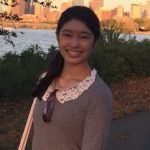Home University: The University of Tokyo
Field of Study: Chemistry and Biotechnology
Status: B3 Expected Graduation: March 2019
Research Host Lab: Prof. Michael S. Wong, Department of Chemical & Biomolecular Engineering
Even though I have decided my major and want to be a scientist in the future in some way, I don’t have a clear image about what it is like to study in laboratory at an academic institution, and I don’t know what I want to be and do clearly. Through the Nakatani RIES Fellowship Program, I would like to learn what it is like to complete a research project by having the experience of conducting a whole series of experiments, and spending a whole month with people at Rice University. I believe that this internship experience will be extremely helpful for me in the my future in the academic world and also in business situations. Thanks to the Nakatani Foundation, I can concentrate on my stay in Texas without worrying about the cost and learn more about opportunities to possibly pursue a Ph.D degree at leading universities in the U.S. I want to utilize this chance well and hopefully connect it to my next steps in the U.S.
In addition to the scientific environment at Rice University, I am looking forward to meeting with the other Japanese Fellows and Nakatani U.S. Fellows if possible. Their ways of thinking about future career plans will stimulate my interest, and I hope that their points of view will provide me various options as a scientist for the future. I would like to contribute to them in the same way as much as possible.
Goals for the Summer
- Make friends and good relationships with people at Rice University and with the other Nakatani Fellows.
- Improve my English ability not only in daily conversations but also in academic writing and presentation skills.
-
Broaden my outlook internationally and scientifically.
-
Stimulate our motivation as an engineer or scientist BY EACH OTHER.
- Enjoy!
Excerpts from Rio’s Weekly Reports
- Week 01: Arrival in the U.S.
- Week 02: First Week in My Research Lab at Rice
- Week 03: Interview with a U.S. Researcher
- Week 04: Reflections on English Language & Life in the U.S.
- Week 05: Research in the U.S. vs. Research in Japan
- Week 06: Final Week at Rice & Research Poster Presentation
- Week 07: Visit to Lehigh University and Return to Japan
- Final Report & Tips for Future Participants
Week 01: Arrival in the U.S.
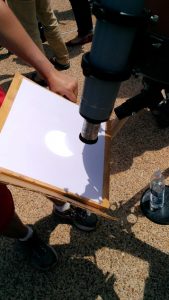
One of the most useful and impressive sessions I had in Tokyo before departure is the seminar about transferable skills for PhD holders by Prof. Iida. I knew that I was encouraged to get a PhD not only in this program but in my University because of the today’s situation with fewer numbers of Japanese students pursuing a PhD. I used to have a negative image about getting PhD because I could not see how I could build up an academic career and making a good living. He mainly talked about the present situation and about what kind of lives PhD holders live in Japan with an analysis of the data. He also mentioned that companies were starting to expect PhD holders to be able to deal with unexpected things flexibly and innovatively as well as hiring them for their expertise. I found that following an academic career to be a professor is not the only way after getting a PhD, and that was a new view for me.
My typical image of Texas was that it was dry and had hot weather like a desert, and “Texan” people speak with southern accent. Instead, I found it was sunny and burning hot, yes, when I arriving Houston. Actually however, there are more people from other countries than I had expected, and their native language is not always English but Spanish is also commonly spoken. For example, the driver who took us from the airport to the hotel on the first day was from Ethiopia. It seems like bus is a common transportation here instead of train for people who don’t own cars, and the bus drivers I saw were black, and sometimes from other countries even though I could not distinguish the southern accent from how Spanish speakers speak English.
I also found the percentage of international students at Rice University was much higher than at my University. This showed remarkably in my host lab where there are more Chinese than American students. Prof. Kono gave some important advice during his lecture on the first day for us to make good use of this research experience in Rice University:
- Learn the big story of your research and how it can be carried out within the first week.
- Learn how to use the experimental equipment and facilities in your lab in order to become more independent and begin to use some by yourself towards the end of the program.
- Learn what the theme and environment of the host lab is like by communicating other members and adjust yourself into the lab.
- Join all group activities.
- Always say yes when you are invited.
I found #5 was the easiest to hear and the most difficult to carry out, because sometimes I get exhausted with a lot of work to do. He also told us what it us like to get PhD in the U.S. and how the poster presentation will be judged in September. I have never made a poster presentation in either language, so it was really helpful for me to imagine what it will be like.
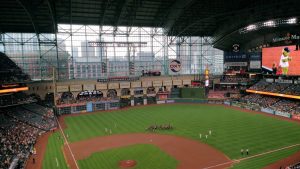
This weekend, I went to see the baseball game with some of the other Japanese Fellows. It was a home game, Astros vs. Athletics, and we won. What surprised me most was the kiss cam. There were some entertainments during the game of major league like dances, songs, and “cam” time that the camera caught the audience on the big screen. There were cam times with specific theme like Lion King, Titanic, and also a kiss. When the audience was caught in sight by the camera, they were expected to follow the theme. It was fun to see, but it was unbelievable for Japanese to kiss in front of the other audience within the big screen, and I found the cultural gap regarding public displays of affection in Japan vs. America.
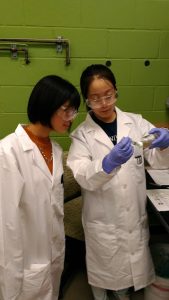
Preparing for Research in the U.S.
While I was in Japan, I got in touch with my host lab’s Professor and he decided who my mentor would be. She sent me some papers related to the research topic by email to help me understand the background of the research enough. I think it is important to know beforehand not only what the lab is going to do but also the member and the numbers of PhD people in the lab, because communication in the lab is one of the key factors to improve my motivation for the research.
- Great tip. One of the easiest ways to do this is to look for the ‘People’ or ‘Members’ page on the lab group website. By looking at the list of current members you may be able to tell how many people are in your lab, how many graduate vs. undergraduate students, and maybe even how many female members of the lab there are.
Question of the Week
When I asked the front at hotel to bring the cutting board to my room, their response to do so were different respectively; one said they didn’t have, one said they would but didn’t, and the other did. Why does it happen at the front in the same hotel? Did I need to tip to them?
- This is an example of customer service simply not being as good in the U.S. as it is in Japan. What they should have said is “I’m not sure, let me check with Housekeeping to see if one is available.” They might not have enough cutting boards and knives for each room so maybe Housekeeping needed to find/look for one for your room. Sometimes you do have to ask for something more than once and this is an example of how sometimes you can get different answers to the same questions. This is why U.S. students who go to Japan often ask numerous times for the same thing or the same question, because in the U.S. you often have to do this to get the ‘actual’ answer. However, in Japan if someone says “I’m sorry, we don’t have that available” you can trust that is the final answer. In the U.S., it sometimes does depend on when and who you ask.
- No, you do not have to tip hotel front desk staff. For more on when and how much you should tip, see Tipping in the U.S., on our resources page. Tipping is very confusing not just for foreign visitors but also for many Americans too.
Week 02: First Week in My Research Lab at Rice
I met my mentor and the host lab’s professor during my first week at Rice University, and my research started this Monday. They prepared a desk for me, gave me a lab safety training, and I started to do some repeating experiences with my mentor to learn more about what the main theme of my research is and how to collect and analyze the data.
My mentor is Sujin. She is a PhD student from China, and she is kind to answer any questions I asked. What surprised me is that she is pregnant. She said she avoids lab work with organic chemicals, which may increase the risks for her daughter. What surprised me much more is that she will keep working in the lab till October, just one month before the anticipated birth date. This is completely different from Japan, where women sometimes quit their jobs once they find out they are pregnant. I actually don’t know what it is like to bear a child, but I guess it is a hard task and even more so if you are not in home country. I found that Dr. Kim, who sits next to my desk, is also a scientist while being the mother of two kids. I hear that it can be very hard for women to make an academic career in science as well as building a happy home at the same time in Japan. It might be the same in the U.S., but it seems easier; at least more so than in Japan.
On the first day of my meeting with my mentor and professor, I was nervous about my poor ability of English. However, I found there were many people from other countries in the lab, especially from China, and their English did not always use ‘correct’ grammar or pronunciation. At that time, I began to feel more comfortable speaking in English and started to enjoy conversation or discussion without hesitation. Even when I sometimes couldn’t make them fully understand, they would ask me to say it again and I could manage to tell them what I wanted to say at last. I know my English is not always enough to communicate well unlike other international students in Rice and I want to improve my English more, of course. However, I feel more confident of my speaking English; much more so than in Japan. And, when I stopped hesitating to speak English, I found I had more opportunities to have a conversation in English and more things to tell. It is a good spiral.
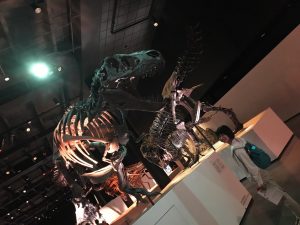
When it comes to this week’s seminars, I found it them really practical and useful. I have never made or even seen the poster presentation before. So, during the seminar on poster development, I learned that designing a good poster is a different task from making a good poster presentation and that both require deep understanding of what I will do in my research. Dr. Moran told us which text styles and graphics we should use and how to improve the overall look of the poster. I would like to learn more about how to edit the text on the poster effectively in order to make my point correctly. In addition to that, the lecture by the CWOVC about how to increase your English vocabulary was informative. What I have done to improve my vocabulary in English is just to check the spelling by dictionary and to try to remember new words by writing them down again and again. She helped us understand that words have much more than its grammatical meaning; there is also connotation. It was also new to me that what is important to expand your imputable vocabulary in any language was to pay attention to the environment you are exposed to.
In addition to my research, I attended two classes at Rice this week. One is the Organic Chemistry class taught by Prof. Ball in the BRC because Organic Chemistry is my major and a Japanese PhD student is a TA at the class. What he talked about in this class was what I had already learned in Japan, but the approach and how to solve the problems were different. Also, I found that homework was difficult, partly because the homework included what the other graduate students in the class had already learned when they were undergraduates. The other was a class about Kinetic and Reactor Design by Prof. Wong, who is my host lab’s professor. It was a class for undergraduates, but I found it difficult to understand the class fully. One is because I cannot understand what I hear and what I read in English at the same time. The other may be because the professor used many acronyms such as w.r.t. and D.E. in his notes.
Research Project Update
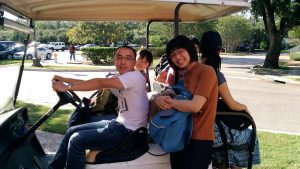
My research theme is how to remove nitrate in water effectively. Nitrate is one of the top 10 contaminants in the U.S., and my host lab has tried to remove nitrate chemically with catalyst of Palladium and Indium. The catalysts can be easily poisoning and what I will do for the following four weeks is to find a better structure of the catalysts in order to solve the poisoning problem and the short life problem. The general method is to make catalysts by controlling the volume of Palladium and Indium, to test the removed nitrate and ammonium by UV-vis, and to analyze the data. Nitrate, ammonium, and some reagent can be toxic, thus I had safe training at the lab and always put on my lab coat that my mentor bought to me, safe glasses, long pants, and gloves in the lab room. I understood the big story of the research and got used to the testing, but still have something unclear related to the difference of alloy and core shell of catalysts. What I did this week is just repeating tests, and I have not started my research yet because of the hurricane and my schedule. I wonder if I will I have enough time to finish my research before the presentation.
Question of the Week

We had a big storm, Hurricane Harvey, this weekend. When I went shopping just for an ice cream on last Thursday, there were so many people buying much water and food in the supermarket. Why did they buy so much for the preparation for the hurricane, including stuff that seem no need to buy now like snacks, an animal stuffed, and a BBQ set?
- People ‘stock-up’ like this before a major storm, such as a hurricane or blizzard, because during the storm and immediately after it may be difficult to get out and travel by car to/from a grocery store until the roads are cleared. Remember, most Americans do not live within walking distance of a grocery store; so, it is important to ensure you have enough food for the time when you may be stuck at home. This may just be a day, or it could be longer depending on how bad the storm is.
- For example, in Houston after Tropical Storm Harvey many major roadways remained closed due to flooding for a few days or even a week or more after the storm; including some highways. This meant that not only was it difficult for people to drive to a grocery store it was also difficult for grocery stores to get new shipments of food delivered via truck in the immediate 1 – 2 days following the storm.
- Also, sometimes the power will go out and this can impact the water system as the pumping stations that deliver water to homes for tap water may also lose power in a bad storm. So, people buy bottled water just in case they aren’t able to drink the tap water should the power go out.
- Usually, you are correct, people buy far too much and often buy things that aren’t really necessities but since American homes have large kitchens, fridges, freezers, and pantries most people will just keep whatever they don’t use during/after the storm and eat/drink it over time.
- In the U.S. we have a saying that it is “Better to be prepared than to be caught unaware” and this is an example of where the expectation is that individuals/families should be self-reliant and purchase/stock-up on things that they might most need during and immediately following a major storm.
Week 03: Interview with a U.S. Researcher
I interviewed Prof. Michael S Wong, who is a Chemical Engineering professor at my host lab. He told me some useful points to become a good researcher and the impressive aspects of research in terms of collaborative work in academia. He was a Canadian born Chinese and he got degrees at universities in the U.S. He majored in Chemical Engineering at the Massachusetts Institute of Technology (MIT), but he changed his major to Chemistry at the University of California, Santa Barbara (UCSB) because of his interest. It surprised me that there were some areas that he didn’t enjoy even though he is a professor, and he has studied areas that interest him, especially nanotechnology and material science. He usually did what interested him at each stage of his career, and that is why his research area covers really broad fields. When I saw his bio on the Rice homepage, I was surprised that he is a professor of Chemistry and Biomolecular, Chemistry, Civil Engineering, and Materials, but now I understand why this happened. He said that changing his major made him special and he found that some fields are connected and related to each other. When it comes to his career path, he decided to pursue an academic career because he wanted to learn more, create new things, and especially teach. He could apply his research in industry or at company, but at a university he could do research collaboratively. I felt that it was a good point to know my potential as a professor judging by my ability of and preference for teaching, which was a new perspective for me. Also, he mentioned the importance of diversity and internationalization in research. According to him, there are many smart people around the world, they have nice ideas and new ways of thinking that are impossible to show up in his mind, and something new is being created 24 hours a day, 7 days a week. He often visits many countries outside of the U.S. and has a lot of collaborative research colleagues. He told me that only reading materials and papers was not real research; exchanging ideas was more important.
In addition, he told me what he expected me to do in his lab during my stay in Houston and ths last part was especially impactful to me. As he said, I will learn about the culture of U.S. by paying attention every time to the environment that surrounds me, learning research skills for my future, and help Sujin, my mentor, as much as possible. Until then, I almost forgot that it this was a collaborative research experience, which was the first time for me. I almost thought only about myself and worried about my research. However, this experience is not only for me, and I would like to help her work because that is why I am here, as he said. She helped me a lot, but I want to help her as well by letting her found out what it is like to be a mentor. My research hasn’t started yet after Harvey hit Houston, and I want to bring something new or important to my lab members when I start.
Research Project Update

I didn’t do anything for research this week except reading materials because of the campus was closed due to the hurricane. Instead, I participated in a Japanese lunchtime discussion with other Rice students who are currently studying Japanese and I volunteered with other students through the Rice Harvey Action Response Team (R-HAT).
Rice has two nice Japanese teachers, one is Ozaki-sensei and she helped the U.S. fellows a lot to learn about Japanese language and culture when they were in Japan. There is a “Japanese lunch table” at the college at Rice, and during this lunch all students can only speak in Japanese. I was surprised that more students spoke Japanese and they spoke more fluently than I had expected. Some of them said they started to learn Japanese because they like Japanese culture like anime and manga, but the others did because of their interest in Japan. There is a similar lunch tableat my university for French, Spanish, and Chinese, but I can’t speak so much in these foreign languages enough to have a conversation except in English, so it surprised me.
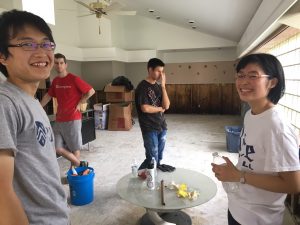
On the next day, the Rice community signed up for volunteering work after Hervey, and I participated. I was surprised and grateful that the volunteering assignment system was great. They prepared a meal and stuff to clean up for us at a church, which made us comfortable to work and made the arrangements smooth. It might be because of the timing, but I felt a complete difference in Japan when I was engaged in the volunteering work after the big earthquake at Tohoku area in terms of how they dealt with the people who were volunteering and what we did. I think what we did today was almost “breaking down” the house rather than helping their recovery (because we had to remove the drywall so that the wood studs of the house could dry out from being flooded. After it dries out; then the family can rebuild the walls. Otherwise the entire house would be covered in mold if you don’t remove the wet drywall first).
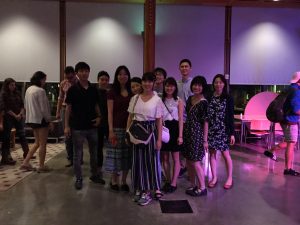
The influence and power of flooding was much bigger than I had expected, and the house looked difficult to be rebuilt. We broke the wet wall and swept and cleaned up everything on the floor. The other members of the volunteering team looked like powerful and tough guys and they did a great job. I felt a little tired after cleaning, but satisfied and fulfilled that their house was all set and ready to be rebuilt. It was unlucky for us that we were stuck at the hotel because of the hurricane, but this experiment cannot be undergone to me. I hope Houston and Texas will recover again as soon as possible.
Question of the Week
When I was engaged in the volunteering work and I wanted to go to restroom, there was no usable one. I asked the neighbor according to my team leader’s advice, and surprisingly, she let me use one even though I was a stranger to her. (Her dog was really curious and interested in me unlike her.) Is it usual for Houston people to give let a stranger use their rest room? It was lucky and really helpful to me of course, but it seems a little dangerous and weird to me.
- This is called ‘being neighborly’ in the U.S. and when you live in a house you often become friends with your next door or nearby neighbors and, if you have children, they will play together and go back and forth between homes in the neighborhood. Of course, before anyone lets their children go play at someone else’s house they will ask to meet the parents and make sure it is safe. So, this helps everyone get to know each other better.
- The ‘feel’ of the neighborhood can actually be an important selling point for a home and something people ask about/consider before the buy. Is there a neighborhood association that hosts potlucks, BBQs or holiday parties? Is there an elementary school nearby that all the local neighborhood children go to so they can get to know friends that live nearby? Is there a neighborhood pool where kids and families can hang out during the hot summer months? This more of these things exist, the more likely it is that when someone in the neighborhood is really in need due to a disaster, illness, or other emergency there will be someone nearby who they can ask for help – even if that help is just to be able to use the bathroom when their bathroom is not working due to flooding.
- This also helps when people move to a new state/city and don’t have family nearby that they can ask for help. Following a major catastrophe, such as a fire or flooded house, it is not uncommon for the entire neighborhood to come together to help those who are in need.
- Each neighborhood is different though and, of course, some people are more outgoing and friendly than others but in a situation like this; I’m sure the neighbor was happy to let one of the students who was volunteering to help repair a home in her neighborhood use the restroom. It’s not something you would ask all the time; but in a situation like this it would be a small thing that the neighbor could do to help out since she had a working restroom and her neighbor did not.
- This has changed a bit over time though, particularly as more American are choosing to move from the suburbs back to the cities, because more families have both parents working full-time now, and as young Americans are delaying getting married and having children. Some people are very close friends with their neighbors; some people may never speak to or meet their neighbors. But overall, being ‘neighborly’ is seen as a good thing in U.S. culture and society.
- The Importance of Being ‘Neighborly’ Before and After a Move
- Being Neighborly, Returning the Favor
- America’s Friendliest Towns
- It Takes a Neighborhood: Purpose Built Communities and Neighborhood Transformation
- Why Won’t You Be My Neighbor?”
- Bowling Alone: The Collapse and Revival of the American Community
Week 04: Reflections on English Language & Life in the U.S.
As for my attitude toward English, the biggest change is that I have begun to hesitate less when speaking in English. I know, of course, that my English ability especially in speaking and listening is far from perfect, but I found myself having conversations in English more confidently and more comfortably now than when I arrived here. The reason is that there are many people whose mother language is not English, including international students at Rice, and their speaking in English is not always as perfect as native English speakers. I always wished I had been brought up in the U.S. when I was in Japan. However here, some people even told me that nonnative speakers of English are not disadvantage but advantage rather. This idea surprised me a lot, but they said that non-native English speakers, like me, could learn English systematically and could build better relationships with people sharing the same mother tongue. It doesn’t mean I don’t need to learn and acquire English any more, but this has helped me feel more comfortable in conversation.
When it comes to my English language acquisition, I always have trouble listening to and understanding fully once they speak English. I usually ask them to say again please in that kind of situation and they repeat more slowly and clearly for me to understand. It works, but sometimes I feel alone when I cannot follow the flow of conversation or cannot understand a joke; especially when talking with a big group. This situation can be found everywhere in daily life, for example at small talk at Uber or on an elevator, at group lunch time with friends, in small conversation at the lab, and etc. The best and shortest way to solve this miscommunication would be to make a friend kind enough to correct my mistakes, but not everybody does so because they are busy with their business.
I came up with two strategies to overcome this issue through the seminars by CWOVC. The first one is paying attention to everything and the other is to get accustomed to and adapt to the environment where I am. It is absolutely true that I am exposed to the environment filled with English much more than in Japan, but I could not find new words, idioms, and ways of speaking in English without paying attention to them. This is right for research as well according to the interview to Prof. Wong last week. I learned some technical terms and colloquial words by paying attention to the environment surrounding me and making efforts to acquire them. For instance, I learned that “raining cats and dogs” means that it rains heavily when Jakob asked us about his Japanese homework on weather forecasts. The other strategy needs a different type of effort. I don’t want to make mistakes in front of a crowd and I don’t want to stop the smooth communication in a group like everyone won’t do. I think there is no way but to get accustomed to how groups speak without disturbing the smooth conversation.
Also, the “trying to get involved” attitude is a vital key to learn quickly. It is no use to deplore myself as a non-native English speaker. I think there are numerous differences between the U.S. and Japan culturally, linguistically, and environmentally, but we have many things in common as well such as friendship, kindness, and hope for peace. I like and respect people I have met here like prof. Wong, Savannah, and Mr. Ohata for example, but I think I would have liked them even if they couldn’t speak English nor Japanese. They have completely different backgrounds and cultures from me, but I have respect for them not because of their spoken language but because of their kindness and passion. I want to improve my English more and more, and at the same time, I don’t want to miss the opportunity to be friends with people that I would never know if I stoped getting involved positively in a community in English. That is why I conclude that the most important point to improve my English is the passion and motivation to communicate with many and various people around me.
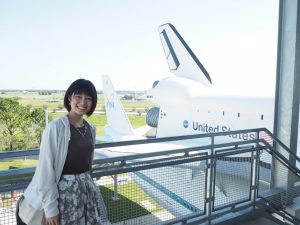
This weekend, I enjoyed Houston and American culture a lot. I went to NASA Johnson Space Center lead by Keiko Kato, a Japanese PhD student at Rice. On the way to go we took the Rice shuttle as a charter and the name board on the front of the shuttle was broken with a pebble or something on the high way. The driver didn’t take any care about it and kept driving at high speed though the board became broken worse by the window the car pushed and we got scary of the sheets. I found that people here drive very fast, maybe because everybody drives for a long distance. At NASA, I got excited to see the airplanes with the smaller one mounted to the other. The tours to the control center and to the training center were also interesting to see. It was Saturday and astronauts at the space center spent their weekends on their own, but one did an experiment for his personal mission or something and we watched the video of him in real time. Only point that could be improved was the souvenir shop. As a Japanese, I expected them to have a big souvenir shop like with “NASA cookies” and “NASA chocolate” for example for small gift to my friends in Japan. I am not sure, but it seems that there is no souvenir culture in the U.S. so that I could not find any suitable gifts as omiyage for my friends and family in Japan as of now.
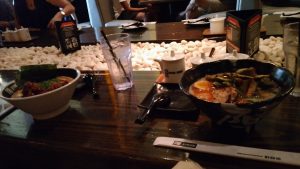
On Sunday, I went to a Methodist church for worship at the sanctuary. I am not a Christian at all, but I heard they welcomed everyone and Jun Ohata explained what it was like, so I tried to join. It was the second time for me to join a service at a church, and the atmosphere there was new and interesting to me. I learned how to sing hymns, how to be baptized, and how they think about their god. I have known a few stories of the Bible, just as knowledge, but it was the first time for me to think about the contents and the meaning of them. It surprised me as well that they started to provide BBQ as lunch after the worship because it seemed strange from the point of Buddhism to use fire to cook meat in the area of the place to pray. It was a good cultural exchange for me and I want to go worship again on the next Sunday if available. I tried ramen at lunch at Jinya as the picture shows. The ramen was great but it was surprising and interesting to me that the most customers there looked like non-Asian. I expected that there was a ramen restraint for Asians, especially Japanese people in Houston, but the fact seems like ramen was famous and popular regardless of their ethnicity (of course it has a certain kind of impact for their choice what to have though).
Research Project Update
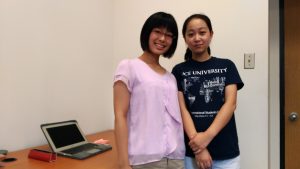
This week, I started lab work again after Harvey and also began to work on my draft poster. While I was engaged in testing and analyzing the catalysts given by the collaborator last week, this week I focused on the synthesis of the catalyst, too. I found that the lab I am working in seldom synthesizes the metallic catalysts instead of collaborating and dividing their own roles. We found that Pd-0.4In/SiO2 catalyst had the most effectiveness and the best selectivity in different ration of bimetal, and we tested that catalyst while changing the solvents. When in industry, they need to purify nitrate not from deionized water like in the lab but from water in natural environment, which contains many kinds of ions and debris that may decrease the effectiveness of catalysts. We found that while fresh water prepared at the average concentration of water from river and lake affected little to the ability of the catalyst, water with high concentration of ions like seawater made the activity of catalysts completely inactive. It could be guessed beforehand, but it means we need more effort to make it practical to use in industry. In the latter half of the week, we synthesized the monometallic catalyst and tested the Pt-In/SiO2 catalysts given by our collaborators. Synthesis reaction takes a long time, which is common in chemistry field, thus we have not tested what we got yet. Pt-In catalysts found to be less active and selective than Pd-In one as I found in papers. I set the rest time aside for data analysis and preparation for the poster draft.
I found one of the challenges I have was that I didn’t fully understand the goal of what I was doing and that’s why I can’t imagine what my poster’s title would be like. I will talk about it with my mentor next week.
Question of the Week
I saw beggars at the Metro station or on Main St. and they often begged food or money to me. However, Mr. Ohata told me on the way back from the church that they sometimes used the money they begged and got for drugs. I don’t know how and what I should do with them because it doesn’t happen so much in Japan.
- This is a very personal choice in the U.S.; whether to give money to people begging or not. Sometimes, if you have a $1 bill or small change, some people might give money. But yes, sometimes that money can be used to buy drugs or alcohol. This is why many people do not give money to people who are begging and just ignore or walk by; not acknowledging them.
- Instead, many people in the U.S. will donate to charities or volunteer at homeless shelters or through their church/mosque/synagogue to serve free meals to the homeless or donate money to build inexpensive housing or other programs to help them transition away from living on the street. Volunteerism is a huge part of U.S. culture and is not limited to just emergency or disaster situations, like Hurricane Harvey, but also to help address long-term or systemic issues and needs. For example, at Rice University the Center for Civic Leadership maintains lists of organizations in the Houston area seeking volunteers and sometimes will organize groups of Rice students on special volunteer days.
- Rice University Volunteer Opportunities
- Volunteer Houston (Database of Volunteer Opportunities in the city)
- Volunteering and Civic Life in the U.S.
- Public Service and Volunteer Opportunities
Week 05: Research in the U.S. vs. Research in Japan
Prof. Kono explained to us what it was like to do research in the U.S. during the orientation in Kyoto and at Rice. I remembered feeling excited as well as anxious for competitive image of being in a lab in the U.S. After about four weeks of research in the lab, I found some difference between what I had expected to do and what I did actually in a lab; and the gap sometimes made me frustrated or worried when conducting research. First of all, I would like to point out here that I only know my host lab and all of what I have felt are based on my experience, and the situation will be definitely be different depending on where you work. I expected to have a close enough relationship with the professor at the lab to ask for a recommendation letter in the future, but he was a very busy person and he didn’t have a lot of time to have small chats with me. I don’t want to speak badly of him, of course. He is a respectable person as a man as well as a researcher, and he always tried to spare his limited time for me. He was always occupied with a lot of work to do and I saw him only at the group meeting once a week and during his class about Chemical Engineering. Other lab members also don’t have a great amount of time to receive his guidance for everything related to research, and I thought that generally the position of being a professor means hard work and too busy to conduct an experiment in a lab by their selves.
When it comes to the atmosphere and the environment in the lab, it was totally different from what I had expected and also from what had experienced in a lab in Japan. I have had a few experiences working in a lab in Japan, which is a part of program ”UROP” for undergraduate students, and that is why I usually compared this research experience at Rice with previous one at my home university. There are far more international students and collaborators from industry in my host lab as I had already mentioned in the previous weekly report, and the average age of lab members is higher; around 27 though I didn’t calculate accurately and just assumed by their academic career years. We have own desks in the office and each individual room is occupied with 4 to 5 desks, so I didn’t have an opportunity to see the other lab members in different rooms from me except at group meeting (though I know it is totally different from lab in the BRC). Half of the group members work in the lab and the others work at their desks. I am not sure if that is the reason why they have less conversation with each other than I had expected them to do. They usually work by themselves and occasionally ask advice of the post-doctoral researchers. I know they have their own projects as a PhD student, but the lab members I have worked with before at the University of Tokyo frequently had a chat and joke when they were working. In addition, the host lab members at Rice look like they are working hard, but their working time is much shorter than I want to do. For example, my mentor drives to school at 9:30 AM every day, does experiments in the morning, has a lunch break for one and a half hours, then works again, and goes back to home around 6 pm. She told me she would work until midnight or even on holidays when it is needed, but it didn’t happen during my stay at Rice. They may work hard but it didn’t seem to show up to their working time unlike people in a lab in Japan who commonly worked from early morning to midnight as I heard from my mentor in my university say. PhD students in the U.S. are morefree and they can control their working time and schedule by their hands unlike my schedule which was filled with seminars and classes every hour in Japan; and I think how hard or how much they work depends on them. I felt culture shock in the academic environment both in a good and bad meaning.
What I found especially good was to have a group meeting. We have a group meeting every week and some students are picked to give a presentation about their research or good research papers they have found. It is a good opportunity to share what they are doing, to practice how to present well, and to stimulate others’ research ideas. It was interesting to me that some members were doing research completely different from the topics my research is related to. Also, through the group meeting, I found it is important to know who did what as well as what was revealed. When I was reading papers in Japan and even after I started working in the lab, I only took care about the contents and discovery, but the background and authors’ names have large meaning to researchers in a lab. Background can provide an idea for application of study especially in the engineering field, and authors’ names have large roles to look at for possible collaborators for research. Students’ abilities to tell what they are doing also can be increased when they are accustomed to do so with useful pieces of advice from professor and other researchers more familiar with research. I always get nervous in front of the audience when I give a presentation, but I know the only way to overcome this is through experience and practice. They really knew how beneficial it is to make the introduction and background clear so the audience fully understands. Some are familiar with chemical substances and its reaction, but others don’t know about this when in different field. For example, Hao, a visiting student from China, mentioned reaction mechanism when in a group meeting, but when I asked questions about what he was doing, he explained the background and motivation of his research. I found it difficult as well as necessary to make this clear, especially to people unfamiliar with that research topic, because sometimes they ask insightful questions that cannot hit me.
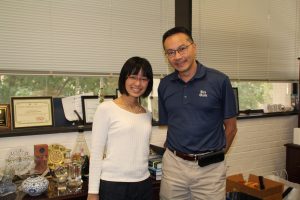
Sad to say, it was the last time for me to see Prof. Wong this Friday because he will visit China next week. It was a really nice experience for me to work for him. I learnt how to compose experiments for research, how to use specific equipment in the lab, how to make my research understood clearly to others, and how much enthusiastic and engaged they are in research in the lab. When I met Prof. Wong on the first day in the lab, he asked me about my career plans after graduation from university. I couldn’t give a clear answer at that time because I even didn’t know what I wanted to do. About a month has passed from that day, and now I can find my answer. I want to get PhD in the U.S., in my major, and work in industry internationally after that. I understand the value of a PhD in academic area and I like to do research. However, I am bad at teaching regardless of subject or field and I am a more reserved person rather than spirited and competitive character. I want to work more practically and principally to be engaged in jobs related to environmental issues on the earth. Whether my dream will come true or not is a different problem and I am not sure if I have ability enough to carry out, but I want to do my best at all times.
I like the surroundings in the lab and taking classes at Rice University even though sometimes I found it difficult from the perspective of cultural gap and my poor English ability. I wish I could stay at Rice longer as an undergraduate student. Undergraduate students at Rice look like they study harder and play harder than I do in Japan. It would be tough and competitive, but more fun. I really enjoyed the dance party at the college and dance class at the Rec Center (gym). I also will miss the clean and green facilities. It was a good experience for me to take a nap in the hammock at Rice under the big trees. I cannot express my thanks in words for doing a research internship in the lab at Rice. It is sad to say goodbye to my new friends and the researchers I met here, but hopefully I want to say see you again to them when I become a famous researcher in the future.
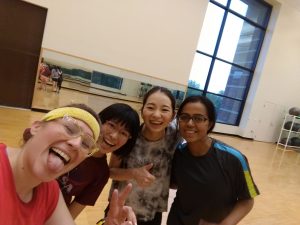
This week, I participated in the dance class at Rec Center and danced Zumba as picture shows. It was the first time for me and I even didn’t know what is Zumba was like, but I liked the sound of “Zumba” and I tried it. There were only girls at the class, and some of them looked as if they were professionals. I don’t usually dance in Japan and it was difficult to mimic, especially the choreography of shaking my hips, but I had a great time. The Japanese lunch discussion tables was also fun, like last week. They each had a nice story about why they started learning Japanese. One told me her boyfriend is a half of Japanese and American and she wanted to speak Japanese to have a conversation with his father. They also told me that attendance at the Japanese lunch table was compulsory to complete the homework. They studied hard and were more motivated to learn Japanese than I had expected.
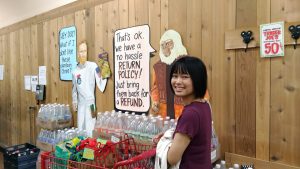
This was the last weekend for me to stay in the U.S., and I not only worked on the preparation of my research poster but also had a lot of fun. Shopping at Trader Joe’s with Mr. Ogawa and Ayaka was one of the most impressive memories in Houston. Only goods of “Trader Joe’s brand” were sold under nice and cute interior design. I was surprised and relieved to see some people who were gay were shopping and nobody looked mind about it because I heard the Republican Party was majority in Texas and I worried if they were acceptable by other customers. It seemed Texas people were kind and welcomed all to the surroundings. We went to watch the football game at the University of Houston. It was the first time for me to watch an away game, and I was overwhelmed by all the UH fans wearing red.
- Fun Fact: Did you know that Houston had one of the first openly gay mayors in the U.S. and that she is also a Rice alumnus? Learn more about Mayor Annise Park and her experience being mayor of Houston in a ‘Red’ (Republican) state.
- Houston LGBT Community and Culture
- Rice University Queer Resource Center
Final Week in Lab
This week, I spent the most time preparing for the poster session because I have already finished my experiments. It was more complicated and demanded more patience of me than I had expected for making tiny changes to the poster. My mentor helped me a lot to design the poster roughly and to make basic components in introduction part from her previous poster. I knew I had short time at Rice in this program, but it is really true that time flies. I wish I could continue my research in the lab for longer period and also, I should have communicated much more with other lab members.
Question of the Week
When I went to the away football game vs. University of Houston, most of audience there were UH and the marching band and cheerleaders at rival accounted for ten times more than those of Rice. It seems unequal to me that home team has much more cheer than away team because they deserve to win a home game. I know the Cougars, a team at University of Houston, is one of the strongest team in Texas. However, in general, is it common in the U.S. to have little cheer at away game?
- The University of Houston is much, much larger of a school than Rice University. At Rice. there are 3,893 undergraduate students but at the University of Houston there are 35,871 undergraduate students alone! So, there are far more students available, by sheer number, to attend football games at UH than at Rice. For this game, UH vs. Rice University; the game was held at the University of Houston stadium because it much, much larger than the Rice University stadium and could accommodate all of the fans from UH who were planning to attend.
- Sports teams in the U.S. typically have some ‘home’ games and some ‘away’ games. Sometimes, they must travel to a different state for their away game. This means that the home team will almost always have more fans attending the game and this is sometimes called the ‘hometown advantage’.
- Since you rotate between having some games at home and others away, its not unfair but it is definitely more fun to attend a ‘home’ game and cheer along with your university’s fans!
Week 06: Final Week at Rice & Research Poster Presentation
Poster Session
This Wednesday, we had our poster presentation and I spent the first half of this week preparing and practicing for the poster session. I had a bunch of time because all of my experiments had already been completed. However, I had to work on the detailed design of my poster and the script about what to tell at the poster session, because I was worried that I couldn’t make myself understood to audience fully and logically in English, a foreign language. I often feel sad to find that I am not confident of my English ability even though I have been learning English for more than 8 years, especially when I compare myself to people learning Japanese for a few years and speaking Japanese as fluently as a native. I asked many people around me to check my poster and the script if there were any literary or culturally mistakes. I appreciate from the bottom of my heart everyone who helped me with my poster including Prof. Wong, Sujin, Sarah, Dr. Gayle Moran, Jun Ohata, and the other Japanese Fellows.
I was a little nervous before the poster presentation began that day, but actually I found it was more fun than challenging. People in front of me asked questions but almost all of them were within my expectation and I had the answers in my mind. I also found it much easier to present about what I did rather than to explain other’s work. What I had to tell at the poster session included everything I did, from designing the poster to detailed mechanism or reactions in research, and therefore I was able to tell them about my research work in my own words. I had heard from Dr. Kim that when Prof. Wong made a poster presentation the first time as a graduate student, a person walked to him and left, saying, “This is what I did ten years ago”. I felt nervous to have criticism or mean comments, but in fact everyone at Duncan Hall was really nice and kind to me. I was excited to share what I had learnt for these five weeks and to have a discussion with experts though I wasn’t fully fulfilled with my results. I wish I could stay and keep studying at Rice, and I will miss all people I met there. However, I am more excited to learn now than when I came to the U.S., and I can’t wait for classes and lab work at my university. I wish I would have had much more time to study and talk with my lab members and friends, but now my goal is to see them again at research conferences or on research papers someday in the future as a researcher. I am really appreciative of everyone I met through this program.
Final Research Project Overview
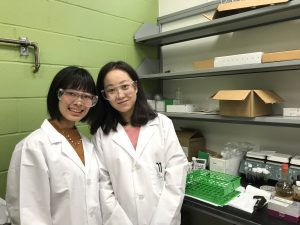
I worked in the catalysis and nanoparticles laboratory with my mentor, Sujin and Prof. Wong. My final research project title is “Nitrate reduction reaction using bimetallic alloy nanoparticles as catalysts” (PDF).
Nitrate is one of the top ten harmful substances in groundwater in the U.S., and it can lead to oxygen deficiency or carcinogen. It became a social issue in the U.S. after 1950 called blue baby syndromes. When babies took groundwater with high concentrated nitrate, bacteria in their stomach changed nitrate to more harmful nitrite in mouth and stomach. It can restrain the ability of hemoglobin from transferring oxygen in body. Babies are more sensitive than adult because they don’t have low pH in their stomachs. The U.S. government made a guideline to the limitation of nitrate in tap water after that. Similar issues had also happened in Japan that cattle led to death when they fed on grass contaminated with nitrate. Industry usually remove nitrate in water to make it drinkable by ion exchanging and reverse osmosis, which is physical removal of nitrate and produce of clean water. However, these processes need to dispose the waste concentrated nitrate. Our new approach is chemical removal of nitrate in water using two metals as catalyst. With catalysts, nitrate can be degraded to nitrogen gas and ammonium. We compared catalysts of Palladium with Indium and Platinum with Indium by testing its activity. Nitrogen gas is harmless as an end product, and we took a look at selectivity to the desired product nitrogen gas as well when testing. Catalysts were synthesized by reductant from metallic compounds while supported by silica to make them work sustainably. Silica has many holes on its surface and small nanoparticles like reduced metals are easily inserted to holes. Palladium is thought to have an affinity to hydrogen, which is reductant, but the active site on the surface of catalyst is blocked by hydrogen and nitrate is deflected when there is only Palladium. Indium doesn’t make bond with hydrogen and it helps nitrate to get an access to the surface of metal. We chose Platinum as a comparison of a base metal because Platinum belongs to the same group as Palladium and it is expected to share the similar chemical character. We tested the synthesized catalysts by measuring concentrations of nitrate, nitrite, and ammonium ions at each time point. Concentrations of nitrate were measured with nitrate selective electrometer, and nitrite and ammonium were colored with particular reagents and the quantitatively analyzed under UV.
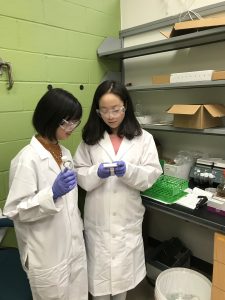 We tested and drew the graphs to know the ability of catalysts to remove nitrate, and its selectivity for generation of nitrogen gas. We obtained the ability of catalysts from the concentration of each ion. As a result, Palladium Indium catalyst had higher activity than Platinum Indium, which is more expensive. Selectivity for nitrogen gas was evaluated according to the concentration of nitrate, nitrite, and ammonium, showing more than 90% selectivity. One of the remarkable points is that the ratio of Indium compared to palladium or platinum also affects the removal ability of nitrate. Palladium with 0.4 Indium on silica had the best catalytic activity, and we tested how it resisted poisoned by other chemical substances. When it was tested on produced buffers like seawater for example, its ability to remove nitrate had changed. The catalysts were not significantly affected by fresh water, brackish water, and oil & gas brackish water. On the other hand, oil & gas saline water and seawater decrease its activity presumably because the active site on catalysts was blocked by anions in water.
We tested and drew the graphs to know the ability of catalysts to remove nitrate, and its selectivity for generation of nitrogen gas. We obtained the ability of catalysts from the concentration of each ion. As a result, Palladium Indium catalyst had higher activity than Platinum Indium, which is more expensive. Selectivity for nitrogen gas was evaluated according to the concentration of nitrate, nitrite, and ammonium, showing more than 90% selectivity. One of the remarkable points is that the ratio of Indium compared to palladium or platinum also affects the removal ability of nitrate. Palladium with 0.4 Indium on silica had the best catalytic activity, and we tested how it resisted poisoned by other chemical substances. When it was tested on produced buffers like seawater for example, its ability to remove nitrate had changed. The catalysts were not significantly affected by fresh water, brackish water, and oil & gas brackish water. On the other hand, oil & gas saline water and seawater decrease its activity presumably because the active site on catalysts was blocked by anions in water.
Our future designed works are following like that. First, We tested the synthesized catalysts at this time, but we would like to check if the catalyst could be recycled. Second, we have already known that catalysts were poisoned by anions in buffer, and we want to know the mechanism of the inhibition. We compared the composition and combination of bimetallic nanoparticles, but morphology and structure of catalysts are also expected to make difference on its ability to nitrate degradation, therefore we can focus on morphology and structure of bimetallic catalysts.
Return to Top
Week 07: Visit to Lehigh University and Return to Japan
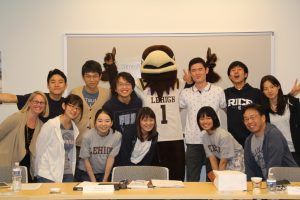
The day after our poster session, our tour at Philadelphia had started. We had to adapt and be flexible because of a delayed plane departure from Houston. I was too exhausted to enjoy the nice and historical trip at Philadelphia, where is one of the most famous places as a starting point of independence in the U.S. At night we arrived at the hotel and I found that Bethlehem was a cozy and comfortable location to stay. Autumn had already begun there. The town looked an old city like London, and Lehigh University really looked like a castle in Harry Potter. The seminars and discussions focused mainly on what I am like and what is my personality. I didn’t know that I was a Maximizer before I took the personality test, and it gave me a new perspective of thinking about who I am, which helps me to build a career path. I found what made me different from the other participants objectively both in good and bad way.
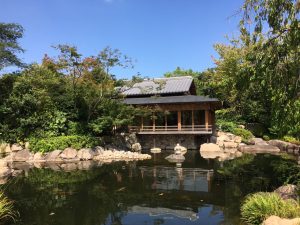
Finally we came back to Japan and had a closing session at Kobe. It seems like a very short time to stay in the U.S. when I look back my memories this summer. Japan, for the first time in about one and a half months, seemed familiar to me with a little sense of strangeness. I found myself surrounded only by Japanese things; Japanese culture, Japanese language, and Japanese people. Now I am in the majority here. I don’t have to mind anymore in Japan whether I can make myself understood in my spoken language nor whether I say something wrong. It was natural to me before I went to the U.S., but now I found that here is a special environment compared to the U.S. that I can live only within Japanese society. I missed a lot of things and people when I was in the U.S. For example, like Japanese cuisine, Japanese style of bathtub, convenient public transportation system, my family and friends, and my university. However now, I miss everything I went through this summer in the U.S. I felt sad and empty on my first day in Japan to finish the all of the Nakatani RIES program sessions, and now I have decided to do my best at my university so that my goal to study in the U.S. again as a researcher will become within my reach.
Final Report & Tips for Future Participants
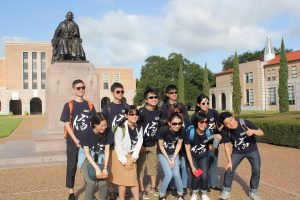
It was a great experience for me to participate in the 2017 Nakatani RIES Fellowship this summer. I learned many things and enjoyed so much that it is difficult to tell how everything about how this experience changed my life and gave a lot of opportunities to my future. But, I would like to share how attractive it is and to expand that this can be kind of a “big turning point” for other students.
First of all, I have to tell my family that I could have survived without their help in the U.S. Although their kind emails from Japan assisted me to keep motivated, I found I could live by myself when I had a sufficient budget and was surrounded by kind people. It was the first time for me to stay outside of my house for more than a month, to go shopping at the grocery stores and cook by myself. I found I was able to adapt to that unique environment at the hotel in Houston and study at school more than I had expected. I rarely missed Japan and my family, though it might sadden them to hear this. Moreover, I learned what it is like to live in the U.S. from my experience and what I heard from other people I saw this summer.
This might be similar with what my parents did when they were staying in the U.S. several decades ago, or perhaps different a little, and I would like to say thanks to my mother for bearing with me while I was in such a challenging environment as a kind of a stranger. I am not sure if I am strong as much as my mentor is, who tries to get Ph.D. while giving a birth, or as smart as my host professor, who represents works within four departments at Rice University. However, I am motivated to learn more about my field and I want to challenge toward my limitations in the U.S. That is why my most urgent tasks now are to prepare for the graduate school and to persuade my family to allow me study in the U.S.
My perspective towards being a professor and academic research have completely changed from this summer internship. I used to judge the academic level of professors by what and how they teach within classes. I didn’t want them to let classes be closed because of their busy schedule. Now I know “Professor” is really a busy position and they are occupied not only with classes but also with research, presentations, academic collaborations, and more and more. I learned how important variety and diversity of work are within an academic area; not only within the laboratory but also in conferences. People from different backgrounds can have different points of view, know other applications, and come up with various solutions. I also found it is harder than getting a job as a professor to keeping working hard at academic field. I learned how to conduct research at in a laboratory at the university, at least in the U.S., and I found that students are expected not only to bear fruits in their field but also to work hard beyond the boundary of national and cultural differences.
Through this program, I learned what are my strengths are and what makes me different from other people during the session I had at Lehigh University. “Maximizer” and “adaptable” are my favorite ones to represent myself from the results of the questionnaire, which may seem commonplace characteristics at a first look, but which nobody in the same class shared with me. I think it is a big advantage to know how I work better both in industry and in academia. This summer internship helped me to cultivate a challenging spirit and learn an attitude to conduct research as well. Because I only had five weeks to stay in the U.S., I wanted to make the best use of the limited time and therefore tried to do everything I could do there such as attending classes and volunteering. It will be the same when I work in the future that one of the most important things is to produce the best and the most results in the limited time with the finite resources. Besides, doing a research was harder and took more time than I had expected. I did get irritated against the slow advances of my research when I was hit by the hurricane and the school had closed. Now I have learned what it is like to make a success in academic areas and how much effort and patience is needed.
I would like to tell other students how exciting it was in the U.S. at first, and then advice my friends to deepen mutual understanding with people that they usually don’t communicate with in Japan. I learned that exchanges with people from different backgrounds could bring me new perspectives and ways of being from the dancing experience both at the gym and at the event in the dormitory at Rice.
After I came back from the closing session at Kobe, my school started and my daily life in Tokyo restarted. I found myself different from what I was like two months ago. I focus on my classes much more than before, attend some classes that are not required subjects, and manage to study and play hard so that I am surrounded by a situation that will enhance my ability and motivation. Meeting the other Japanese Fellows stimulated me to study more. They are so hard working as well as nice friends and I am convinced of their success both in academic fields and in companies. I would rather see them again with good report rather than getting behind of them. Plus, I have started to be involved in some new communities in English so that my English ability would increase enough to study abroad.
Advice for Future Participants
I really want students in Japan to apply for the next summer internship program first. I expect them to expand their limitation physically and mentally, and have a lot of fun. The best piece of advice that I would like to tell future students is to bring spare contact lenses in case you let the ones flushed away at a washbowl; the sink stopper doesn’t always work well unlike in Japan!
Final Question of the Week
What is the ratio of graduate students in the U.S. who tend to stay in academia vs. those who work in industry far from their majors on average?
- This varies greatly and I don’t think there is good, nationwide data to specially answer your question. However, more and more universities are encouraging both undergraduate and PhD students to consider careers in industry as there are relatively few tenure-track faculty positions available each year.
- For more on this, see our website page on Career Resources for Science & Engineering Students.
Follow-on Project
Some projects I have thought of to promote the Nakatani RIES program and to expand the number and the quality of undergraduate students doing research are:
- Sharing my experimental research with my friends in every community both on oral and online with SNS
- Encouraging sophomore students in the English course that Nina and I participated in at the University of Tokyo
- Promoting the name of Nakatani through my blog that I was writing in this summer in private.
I found this fellowship program when I was looking for a summer program in the U.S. for this summer vacation, because I was supported by the English course called GLP-GefIL that I mentioned. Actually, the most of the other programs I found cost me a lot of money and were only open from Jun to July, when I had the compulsory classes unlike people majoring on non-STEM such as education and literature. Sophomores in the same course, majoring in STEM will have difficulties to find potential programs next summer as well. I will be glad to let them know about Nakatani RIES fellowship which is held in August – September so they know they too can study abroad.
I think that the names of Nakatani and Rice University are still unfamiliar with Japanese undergraduate students and that may keep the number of applications relatively low. Through the experience of my follow-on project, especially direct oral presentations, students are likely to be motivated and stop hesitating to step up to the challenge of studying abroad and doing research in an unfamiliar situation.
